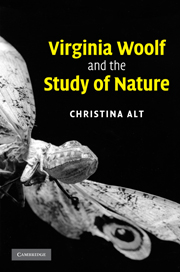Book contents
- Frontmatter
- Contents
- Acknowledgements
- List of abbreviations
- Introduction
- 1 The natural history tradition
- 2 The modern life sciences
- 3 ‘To pin through the body with a name’: Virginia Woolf and the taxonomic tradition
- 4 Laboratory coats and field-glasses: Virginia Woolf and the modern study of nature
- 5 Representing ‘the manner of our seeing’: Literary experimentation and scientific analogy
- Notes
- Bibliography
- Index
1 - The natural history tradition
Published online by Cambridge University Press: 04 August 2010
- Frontmatter
- Contents
- Acknowledgements
- List of abbreviations
- Introduction
- 1 The natural history tradition
- 2 The modern life sciences
- 3 ‘To pin through the body with a name’: Virginia Woolf and the taxonomic tradition
- 4 Laboratory coats and field-glasses: Virginia Woolf and the modern study of nature
- 5 Representing ‘the manner of our seeing’: Literary experimentation and scientific analogy
- Notes
- Bibliography
- Index
Summary
Due to the unique conditions governing the life sciences in Britain in the late nineteenth and early twentieth centuries, as a result of which stagnation gave way to rapid change, Woolf was familiar with a range of scientific approaches to the study of nature. The lingering influence of the ‘so-called “classics”’ of mid-nineteenth-century popular natural history ensured Woolf's childhood familiarity with the taxonomic tradition in its quintessentially mid-Victorian form; however, rapid changes in the life sciences in the late nineteenth and early twentieth centuries meant that she also witnessed the rise of laboratory biology, ethology, and ecology as alternative means of studying nature. The next two chapters provide the historical and scientific background necessary to understand late nineteenth- and early twentieth-century developments in and perceptions of the life sciences.
This chapter focuses on the taxonomic tradition of natural history, a necessary point of departure for any discussion of the development of the modern life sciences, for the new disciplines that arose in the late nineteenth and early twentieth centuries defined themselves against this tradition. The practitioners of the emerging disciplines of this period were inclined to be dismissive of taxonomic work, viewing it as a preoccupation that had impeded the progress of the life sciences in Britain, and this bias in the outlook of Woolf's scientific contemporaries was an important element of the intellectual context in which Woolf's own perceptions of the various disciplines of the life sciences were formed.
- Type
- Chapter
- Information
- Virginia Woolf and the Study of Nature , pp. 14 - 37Publisher: Cambridge University PressPrint publication year: 2010



